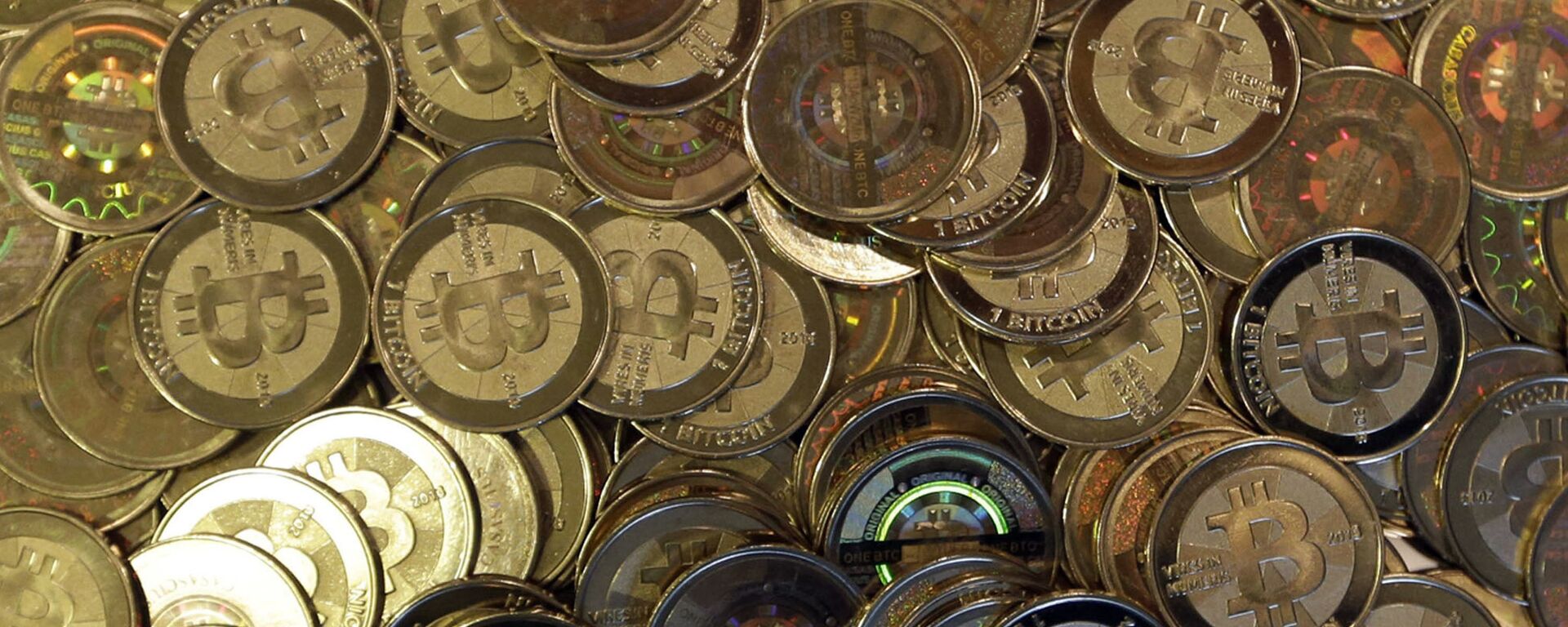https://sputnikglobe.com/20240818/cash-is-king-many-germans-remain-uneasy-over-prospect-of-looming-digital-euro-1119815156.html
Cash Still King: Many Germans Remain Uneasy Over Prospect of Looming Digital Euro
Cash Still King: Many Germans Remain Uneasy Over Prospect of Looming Digital Euro
Sputnik International
The European Central Bank began the “preparation phase” for the rollout of its ‘digital euro’ central bank digital currency (CBDC) scheme last October, but has held off on its implementation. In April, Deutsche Bundesbank president Joachim Nagel assured that “it may take another four or five years before [the CBDC] is actually implemented.”
2024-08-18T15:45+0000
2024-08-18T15:45+0000
2024-08-18T19:17+0000
economy
donald trump
europe
business
germany
slovenia
the european central bank (ecb)
european union (eu)
bundesbank
https://cdn1.img.sputnikglobe.com/img/07e8/08/12/1119815396_0:97:1024:673_1920x0_80_0_0_8c9040c2f62e67ebd4ad82074746dd7a.jpg
Cash-loving Germans are leading the charge in opposition to the digital euro among Europeans, with just under half saying they “probably” or “definitely” won’t use the new payment system if or when it arrives.A survey by the Forsa Institute for Social Research and Statistical Analysis on behalf of Deutsche Bundesbank found that while 15% of respondents said they “definitely” would use the digital euro, and 35% are ready to give it a whirl, 25% “definitely won’t use” it, and 24% “probably won’t use” it. One percent of respondents were undecided. The representative survey queried 2,012 people this past April.Germans are among the leaders in Europe when it comes to the ‘cash-is-king’ mentality, holding on to 500 euro notes long after other EU members’ central banks had dropped them. In 2019, a Bundesbank poll found that 88% of Germans would continue to prefer paying cash even after the 500 euro bill was no longer issued, with the note popular for large purchases.In the EU, the share of cash in P2P payments was above 80% in Germany, Cyprus, Slovenia, Greece, Italy and Austria in 2022. Estonia, Finland and the Netherlands have led the charge in cashless payments. In these countries, cash accounted for less than half of P2P transactions, according to European Central Bank data.Germans and other Europeans have an array of concerns regarding CBDCs, from privacy and control over finances to fears of overdependence on technology in general. The European Central Bank’s assurances that the new currency will remain private and secure using encryption and hashing don’t seem to assuage concerns, particularly among older generations.The European Central Bank is expected to make a decision on whether or not to implement the digital euro scheme by late 2025, although some of the region’s top bankers suggest its implementation may be put off, possibly until closer to the end of the decade.Unlike decentralized digital currencies like Bitcoin (which come with their own risks) CBDCs have garnered their share of criticism related to their centralization – specifically fears over finance-related censorship, increasing centralization and politicized control over spending and savings. Proponents say the technology will promote innovation in payments, keep central banks central to monetary systems, encourage “social responsibility,” including through the potential programming of currencies to be spent only on a list of approved goods or services, ease the doling out of government assistance, and potentially even simplify financial transactions between countries as a workaround to sanctions.In the US, where opposition to state economic control is even stronger in some states than in European countries, opposition to CBDCs has taken on a political dimension, with former president and Republican nominee for president Donald Trump embracing Bitcoin and vowing to block the creation of a digital dollar on the campaign trail.So far, CBDCs have been launched in three countries (the Bahamas, Jamaica and Nigeria), with 36 experimenting in a pilot mode, and thirty more developing them. Projects have been are inactive in 17 countries, including Denmark, North Korea, Venezuela and Zambia, and have been canceled by two countries - Ecuador and Senegal.
https://sputnikglobe.com/20240326/could-cryptocurrencies-become-as-reliable-as-gold-1117565811.html
https://sputnikglobe.com/20231121/switch-to-payments-in-digital-national-currencies-may-accelerate-dedollarization---russian-minister-1115099284.html
https://sputnikglobe.com/20240718/why-crypto-surged-after-trump-assassination-attempt-and-could-climb-higher-if-he-wins-1119420008.html
germany
slovenia
Sputnik International
feedback@sputniknews.com
+74956456601
MIA „Rossiya Segodnya“
2024
News
en_EN
Sputnik International
feedback@sputniknews.com
+74956456601
MIA „Rossiya Segodnya“
Sputnik International
feedback@sputniknews.com
+74956456601
MIA „Rossiya Segodnya“
where have cbdcs been implemented, do germans support cbdcs, what are cbdcs, what is a central bank digital currency
where have cbdcs been implemented, do germans support cbdcs, what are cbdcs, what is a central bank digital currency
Cash Still King: Many Germans Remain Uneasy Over Prospect of Looming Digital Euro
15:45 GMT 18.08.2024 (Updated: 19:17 GMT 18.08.2024) The European Central Bank began the “preparation phase” for the rollout of its ‘digital euro’ central bank digital currency (CBDC) scheme last October, but has held off on its implementation. In April, Deutsche Bundesbank president Joachim Nagel assured that “it may take another four or five years before [the CBDC] is actually implemented.”
Cash-loving Germans are leading the charge in opposition to the digital euro among Europeans, with just under half saying they “probably” or “definitely” won’t use the new payment system if or when it arrives.
A
survey by the Forsa Institute for Social Research and Statistical Analysis on behalf of Deutsche Bundesbank found that while 15% of respondents said they “definitely” would use the digital euro, and 35% are ready to give it a whirl, 25% “definitely won’t use” it, and 24% “probably won’t use” it. One percent of respondents were undecided. The representative survey queried 2,012 people this past April.
Germans are among the leaders in Europe when it comes to the ‘cash-is-king’ mentality, holding on to 500 euro notes long after other EU members’ central banks had dropped them. In 2019, a Bundesbank
poll found that 88% of Germans would continue to prefer paying cash even after the 500 euro bill was no longer issued, with the note popular for large purchases.
In the EU, the share of cash in P2P payments was above 80% in Germany, Cyprus, Slovenia, Greece, Italy and Austria in 2022. Estonia, Finland and the Netherlands have led the charge in cashless payments. In these countries, cash accounted for less than half of P2P transactions, according to European Central Bank
data.
Germans and other Europeans have an
array of concerns regarding CBDCs, from privacy and control over finances to fears of overdependence on technology in general. The European Central Bank’s assurances that the new currency will remain private and secure using encryption and hashing don’t seem to assuage concerns, particularly among older generations.
The European Central Bank is expected to make a decision on whether or not to implement the digital euro scheme by late 2025, although some of the region’s top bankers
suggest its implementation may be put off, possibly until closer to the end of the decade.
Unlike decentralized digital currencies like Bitcoin (which
come with their own risks) CBDCs have garnered their share of criticism related to their centralization – specifically fears over finance-related censorship, increasing centralization and
politicized control over spending and savings. Proponents say the technology will promote innovation in payments, keep central banks central to monetary systems, encourage “social responsibility,” including through the potential programming of currencies to be spent only on a list of approved goods or services, ease the doling out of government assistance, and potentially even simplify financial transactions between countries as a workaround to sanctions.

21 November 2023, 12:34 GMT
In the US, where opposition to state economic control is even stronger in some states than in European countries, opposition to CBDCs has taken on a political dimension, with former president and Republican nominee for president Donald Trump
embracing Bitcoin and
vowing to block the creation of a digital dollar on the campaign trail.
So far, CBDCs have been
launched in three countries (the Bahamas, Jamaica and
Nigeria), with 36 experimenting in a pilot mode, and thirty more developing them. Projects have been are inactive in 17 countries, including Denmark, North Korea, Venezuela and Zambia, and have been canceled by two countries - Ecuador and Senegal.





